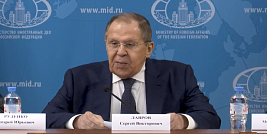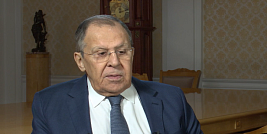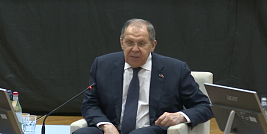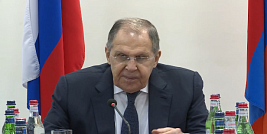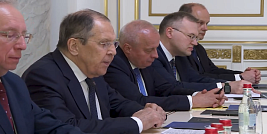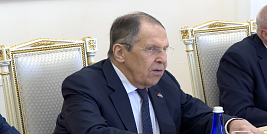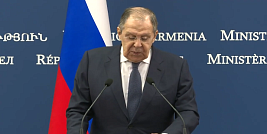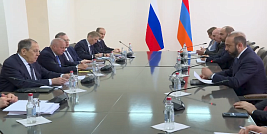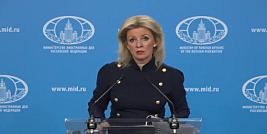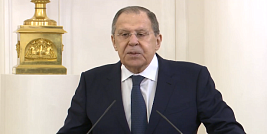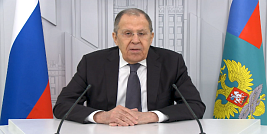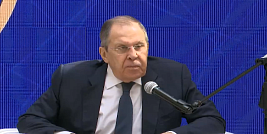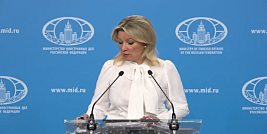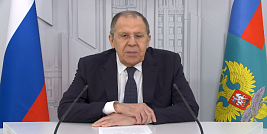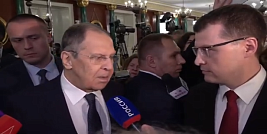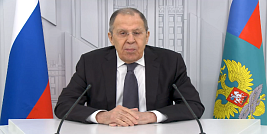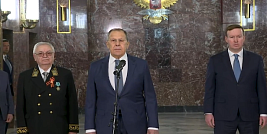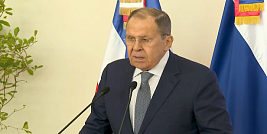Foreign Minister Sergey Lavrov’s remarks and answers to questions from teachers and students of the Armenian branches of Russian universities, members of the expert community, and activists of the youth wing of the Eurasia Autonomous Non-Profit Organisation, Yerevan, May 21, 2025
I am delighted that our meeting began with the national anthems of the Russian Federation and the Republic of Armenia. It is really important for us to always feel an emotional connection to our roots and to what unites us. Motherland embodied in the national anthem and the coat of arms is not just a symbol. In fact, this is an important part of upbringing, particularly in younger generations. But we are not paying a state visit after all. I would like to mix with students and teachers for a little more.
Thank you for the video that shows how the university is developing. There was a small problem at the end. Situations like this one are numerous in Europe nowadays. They would say right away that “Russia did it.” So you ought to decide how you will explain this.
But, joking aside, it is fine to be here again. It is a pleasure to see that the university makes strides and sets itself goals that meet the requirement of training national personnel for the Republic of Armenia’s foreign policy and other services, personnel who have a good command of Russian and knowledge of Russian history and the current state of relations between our countries. This reserve, these activists are of importance for us in building up mutually beneficial efforts to strengthen the highly positive trends observed in our trade, economic and investment ties over recent years (the last couple of years at the very least).
Russia remains the main investor and trade partner for the Republic of Armenia. Trade has reached a record high, inching close to $11.6 billion. If we take the other members of the Eurasian Economic Union, the figure will total $13 billion. That the Armenian economy advances at a fast rate is a result of its cooperation with the EAEU. We discussed this earlier today with President of the Republic of Armenia Vahagn Khachaturyan and Foreign Minister of Armenia Ararat Mirzoyan. We will certainly discuss this trend and the tasks involved in making it stronger with Prime Minister of Armenia Nikol Pashinyan immediately after our meeting here.
In recent years, some discrepancies have emerged in our positions with regard to how we see the further development of our relations, alliance, and strategic partnership, including alliance within the framework of the CSTO, the CIS, and the EAEU.
Today, subsequent to the meeting between President of Russia Vladimir Putin and Prime Minister of Armenia Nikol Pashinyan in autumn 2024 – during which our leaders resolved to reinstate comprehensive contacts across all areas, as these had, to a certain degree, lapsed somewhat in the period preceding their discussions – and in accordance with the leaders’ understanding, I received Minister of Foreign Affairs of Armenia Ararat Mirzoyan who visited Moscow in January. We are now here on a reciprocal visit.
Allow me to state immediately that, as instructed by our leaders, we are engaging in the frankest discussions – not only on matters positively received by both capitals and conducive to expanding mutually beneficial projects, but also on issues where our perspectives diverge. This includes, notably, the processes unfolding in the South Caucasus, where, broadly speaking, two trends are in contention.
The first trend involves respecting the sovereign choices of the countries situated here – the nations of the South Caucasus, Transcaucasia (as we once referred to it) – Armenia, Azerbaijan, and Georgia – while also acknowledging the legitimate interests of their immediate neighbours: Russia, Iran, and Türkiye. The 3+3 platform was established in its time, uniting this group of six (two trios), which has already convened a couple of ministerial meetings in Istanbul and Tehran and is now preparing for a third. There is a fundamental understanding to deepen sectoral dialogues within this framework – encompassing energy, transport, and cultural ties – for which considerable potential exists. We are currently finalising the venue for the third ministerial meeting, though I am confident this matter will be resolved imminently.
This 3+3 process is wholly unencumbered by any obligations requiring participants to curtail relations with states outside the South Caucasus region. No such commitments exist. That is the first trend.
The second trend, however, is precisely that our Western counterparts – primarily the European Union, though it is challenging to speak definitively about the United States at this stage, as the administration of Donald Trump has yet to articulate its clear, doctrinal stance on the South Caucasus – nevertheless, their predecessors in the Joe Biden administration, alongside the EU, openly sought to extend their dominant influence over this region, to bend unfolding processes to their will, and to prevent the consolidation of the three South Caucasus states with their major neighbours – Russia, Iran, and Türkiye. This objective persists.
This trend, this modus operandi of our Western colleagues, is not unique to the South Caucasus but extends to Central Asia and other parts of our vast, shared continent. The same principle applies here: “either with us or against us.” The facts are well known. When EU member states propose collaborative projects to Central Asian and Eastern European nations – including, notably at present, Moldova – as well as to countries such as Mongolia and others across the Eurasian continent, all such proposals involve financing arrangements that, in one way or another, grant the “donors” access to highly sensitive information. This includes data pertaining to allied integration processes within the CSTO and the EAEU, customs statistics, border cooperation, border infrastructure, and cross-border controls. The trend is unmistakable. Politically, conditions are imposed requiring recipient nations to curtail or sever their cooperation with the Russian Federation in exchange for such generous assistance. “Either with us or against us.” “Divide et impera.” This principle remains entrenched in Western foreign policy, which – whether recalling or never having forgotten its near 500-year dominance in global politics through colonial wars, expansionism, and slavery – seeks to sustain itself even now at the expense of others.
In contrast, our stance is based on equality, mutual respect and, above all, the principles that have been set out in the UN Charter and are approved by everyone without exception. It states unequivocally that the United Nations Organisation is based on respect for the sovereign equality of states.
I cannot recall a single conflict or crisis situation – not a single one – that occurred after 1945, when the UN was established, where the West respected the principle of sovereign equality. On the contrary, the West always promoted a settlement concept that primarily met its own interests. The only exception was the Second World War, or more precisely, the alliance of the Soviet Union, including the Russian people and the Armenian people, with Western countries. It was created because London and Washington saw – it took them a long time to decide which conflicting party to side with – that the tide of war had turned and they should hurry to seize European territories so that they would be able to make decisions on the post-war structure of Europe later.
This does not downgrade the heroism of the Americans, the British and the French resistance or resistance in other European countries whose authorities bowed to Hitler Germany. Neither does it belittle the heroism of our Serbian and Montenegrin friends, who fought against the Nazi hordes.
Nevertheless, that pragmatic, if not cynical, consideration prevailed until the beginning of WWII, when London and Paris chose whom to side with and seriously analysed the option of siding with Hitler to jointly crush the Soviet Union.
That option existed during the last days of WWII. Even before Victory Day, when the banner of victory was raised over the Reichstag and Hitter’s Germany surrendered, our Western allies continued to consider plans which were formalised as Operation Unthinkable, as we know now from archival documents. It is good that they saw that their plans were unthinkable. The name is self-explanatory. That plan provided for massive bombing strikes on Soviet cities, including with the use of nuclear weapons. Thankfully, common sense prevailed. Our relations entered the path of peaceful coexistence, which turned into the Cold War after Winston Churchill’s Fulton speech and led to the establishment of NATO and the creation of the Warsaw Treaty Organisation in response.
That chain of events can be traced to this day, beginning with the violation of the Western promises on the non-expansion of NATO to the east, to East Germany after its reunification with West Germany, which they made after the dissolution of the Soviet Union, and the rules of military deployment there. They have violated all their promises. NATO is expanding, there is the bloc’s infrastructure in East Germany, and this process is ongoing.
What is the essence of these deliberations? There have been a large number of what some describe as lost opportunities and others denounce as Western lies. The promise not to expand NATO has been thrown down the drain. The promise to respect the principle of indivisible security, when no state strengthens its security to the detriment of other states, and no state or organisation tries to dominate in Europe, has been broken.
Our numerous attempts, starting in 2008, to implement the principle of indivisible security, so that nothing threatens our national interests, failed. They told us that this principle had been approved at the highest level in the OSCE, yet it was nothing more than a “political declaration.” We asked in reply if the word of their presidents and prime ministers was worth anything. They told us that it was, politically, but they cannot legally guarantee this.
We made the proposal, and we have repeatedly proposed since 2008 that the political commitment should be codified in the form of legally binding documents. No way! But why? After all, we are suggesting that the commitment not to interfere with each other’s security, a commitment that has been officially approved, should be made legally binding. As simple as that. Because it is only NATO that can provide legal security guarantees. After all, this did not start yesterday. It all started at least 20 years ago, when President of Russia Vladimir Putin addressed the Munich Security Conference in 2007, saying we had come to terms on this and on that but later it transpired that the whole thing was not worth a pin from your point of view. You want to dominate, suppress the national interests of all others, and bend them to your will, to your selfish designs and your wish to derive benefits by what are, in effect, neo-colonial methods.
Therefore, we have clean conscience. We have warned them over the past 20 years, almost on the daily basis, that all this could come to grief. But after the 2014 coup d’etat, they began converting Ukraine to an “anti-Russia.” They encouraged the junta that came to power as a result of the coup despite the EU-guaranteed plan of settlement. They wanted to eradicate Russian from all spheres of life. They sent armed militants to invade Crimea, but the people of Crimea said that they do not want to have anything to do with them. Donbas said the same. They used all its resources to support this openly Nazi regime. And so, we are where we are.
They deceived us in February 2014, when they staged a coup the morning after a settlement agreement was signed. They did the same a year on by signing the Minsk agreements, which they immediately violated, confessing later that they had no intention whatsoever to comply with them, but just wanted to play for time in order to pump Ukraine full of weapons.
They are using the same tactics today by urging us to accept a truce without any preconditions. Their aim is to give Ukraine a respite and to “load” it with new batches of weapons. Not so long ago, President Vladimir Putin again recalled the talks in Istanbul in April 2022, when we initialed the Ukraine-suggested principles of settlement. We accepted these. The principles were initialed by both us and the Ukrainians. But later the West forbade them to sign the treaty based on these same principles.
So now, when they tell us: Let us have a ceasefire and then we’ll see, we say: No way, guys, we have been through it all before. We don’t want it that way any longer. And so today, when all these Macrons, Starmers, Ursulas von der Leyen, and other European characters are writhing in hysterics and urging the US to join the anti-Russia crusade and increase the number of sanctions, this is a complete giveaway for them.
Quite recently, the European Union approved the 17th package of anti-Russia sanctions. It appears that they had drafted it last week but said that they would wait until Donald Trump’s telephone conversation with President Vladimir Putin, and that they would introduce this package or not depending on its results. But we are demanding a truce without any preconditions. At the end of their conversation, both leaders called for determining the parameters of a long-term peace deal that would help eliminate the root causes of this crisis. These root causes included NATO’s eastward expansion and the strategic line of the Ukrainian junta, that had gained power through a coup d’etat, to eliminate education in Russian, Russian-language media outlets and culture. They have recently approved a decision to liquidate the canonical Ukrainian Orthodox Church. Today, we have provided our Foreign Ministry colleagues with a list of laws that had been passed long before the special military operation, which aimed to oust the Russian language from all spheres of life.
This should not be the case if you champion human rights, if you are members of the United Nations Organisation who have ratified the UN Charter whose Article 1 states expressly that everyone should promote and encourage respect for human rights without distinction as to race, sex, language, or religion. Ukrainian legislation expressly bans the Russian language and religion. There is nothing like this anywhere else. Today, we have recalled that Armenia does not ban the Azerbaijani language. According to the Constitution of Azerbaijan, the Armenian language and Armenian-language education are allowed in Azerbaijan, including Nagorno Karabakh. On the other hand, there are few people left there, but this is not important. The legislative framework is important. The Arabic language is legitimate in Israel, the same is true about the Hebrew language in Arab countries. However, the Russian language is banned everywhere in Ukraine.
It is a funny paradox, to a certain extent, that they mostly speak to each other in Russian because they find it more convenient. They simply want to liquidate any outward signs of our common culture, history and our common destiny in this world of Orthodox Slavic nations. They also want to “kill” Orthodoxy for the same reason.
Let me go back to what the European Union had anticipated from the meeting and the phone call between US President Donald Trump and President of Russia Vladimir Putin. The initial response was that they would look into it. Following the conversation, both Putin and Trump offered a positive assessment, agreeing on the need to develop concrete steps toward a long-term, sustainable resolution. This included the potential use of ceasefires, but more importantly, a focus on addressing the root causes of the conflict. And what did the European Union do in response? It announced the approval of the 17th sanctions package.
This indicates that they were seeking an escalation of the crisis. In other words, they claimed to have listened, but saw no support for a ceasefire without preconditions – that would have allowed them, the Europeans, to rearm Ukraine. That’s what they were aiming for. These developments suggest that the Euro-Atlantic security framework we are currently part of, particularly within the OSCE, is becoming obsolete. This is especially evident as Western participants in this framework are clearly abusing their position. A growing divergence in the approaches of the United States and Europe has also become apparent. Most importantly, security is fundamentally rooted in the consideration of geopolitical realities. Geopolitics and geography alike underscore the necessity of building bridges among all nations across the Eurasian continent. This means, first and foremost, fostering cooperation among the existing regional structures: the SCO, the EAEU, the CSTO, the CIS, China’s Belt and Road Initiative, the GCC, and ASEAN. South Asia also has its own integration frameworks, and many of these organisations have already begun establishing ties with one another.
It is somewhat paradoxical not to make use of the advantages offered by geography and history. Here on the largest continent, we have yet to fully tap into the vast, God-given potential for economic, logistical, and infrastructure development. Analysis indicates that leveraging the opportunities presented by the Eurasian continent – particularly through trade routes such as the Northern Sea Route – could prove significantly more efficient than current alternatives, including those passing through the Suez Canal.
However, there are those who are intent on preventing such a mutually beneficial unification of the countries across Eurasia, including those in the South Caucasus and Central Asia. Nevertheless, we continue to advance this effort.
President Vladimir Putin has proposed the creation of a Greater Eurasian Partnership, rooted in practical cooperation and the interaction of existing integration structures, which would serve as the foundation for a future Eurasian security architecture.
I repeat, this is a long-term endeavour. It is not some abstract blueprint devised by others. As NATO itself has stated, the alliance seeks to extend its influence beyond the territories of its member states to the Far East, the South China Sea, the Taiwan Strait, and Southeast Asia. This ambition stems from a desire to contain the People’s Republic of China and to isolate Russia.
No, our approach is not to impose speculative concepts, especially those driven by ideology or geopolitics, but rather to foster dialogue and the exchange of perspectives. This has been the guiding principle for the past two years at the International Conference on Eurasian Security, convened by Belarus. The conference brings together ministers, political analysts, and representatives from various countries, including some from the European Union and other parts of Europe.
We anticipate that Armenia will take part in these processes. We fully respect the desire of our Armenian partners to develop relations with other countries, whether European or non-European, and with international organisations across various regions. However, we believe that such cooperation should be consistent with the principles that underpin our interaction within the CIS, the EAEU, and the CSTO.
Question: What do you think about the current state and outlook for Russian-Armenian relations? Are there some loose ends that we need to tie up?
Sergey Lavrov: I touched upon this issue in my extended opening remarks.
There were some loose ends, as you put it, and certain complaints in our relations. For example, after the incident at Jermuk in 2022, our Armenian colleagues decided that the CSTO failed to fulfil its obligations when it had not intervened in the clashes, which lasted three days before they were stopped.
After that, a CSTO summit was held in Yerevan in October 2022. Following the Jermuk incident, the CSTO mission led by the organisation’s secretary general visited the region to see if security could be strengthened on that part of the Armenian-Azerbaijani border. It has submitted a plan for the deployment of a group of CSTO military observers, which we spent a long time coordinating before the CSTO summit in Yerevan at a meeting of foreign and defence ministers. We have coordinated it.
But when the heads of state and government met the next morning, they failed to approve it. The Armenian side was not satisfied with the assessment included in the plan. As we say, you can give advice, but you can’t make someone take it.
Soon afterwards, the Armenian authorities accepted, with Azerbaijan’s agreement, the idea of placing an EU observer mission there. That was Armenia’s choice. We did not argue against it. But several weeks later the European political community held a meeting at the initiative of President of France Emmanuel Macron. He openly described it as a meeting of European OSCE members minus Russia and Belarus. This is an outspoken position that points to what this European political community was created for.
We have discussed this today. The European political community has recently met in Albania. Armenia reportedly wants to host such a meeting next year. We have provided our assessment of that idea. I hope that it is clear to everyone and will be respected, just like we respect the actions of our partners and allies within the CIS and the CSTO.
When the first meeting of that European political community was held in Prague in November 2022, the leaders of Armenia and Azerbaijan, guided by President of the European Council Charles Michel and European Commission President Ursula von der Leyen, approved a document which says that Karabakh is a territory whose status was formalised in the 1991 Almaty Declaration on the “divorce” of the Soviet republics. According to it, Karabakh is part of Azerbaijan.
We accepted that as a sovereign decision of the Armenian authorities, even though when we tried to stop that war, President Vladimir Putin, President Ilham Aliyev and Prime Minister Nikol Pashinyan talked overnight on November 9, 2020, and coordinated a document on the termination of hostilities, under which the status of Karabakh was to be decided later. It was not determined in that document.
It was a challenging task. Considering that this issue is of utmost importance for both nations, the issue of the status of Nagorno-Karabakh was to be discussed at subsequent talks. Several years later, in 2022, the Armenian authorities decided that its status was determined in the 1991 Almaty Declaration. We respect any decisions, and we had no problems with that decision either, although it put in question the presence of our peacekeepers, who had been deployed in Nagorno-Karabakh in accordance with the November 2020 agreement, which says that the territory of Nagorno-Karabakh is under control of the Russian military peacekeeping force. It means that it was regarded as a neutral zone. Since it was decided in 2022 that Nagorno-Karabakh is an Azerbaijani region, we gradually pulled our peacekeepers out of it. And now we have what we have.
Yes, there was some misunderstanding and suspicion, as you have pointed out. We are ready to discuss all aspects of that situation, our actions and somebody’s inaction. We did not violate any obligations. It was a sovereign decision of the Armenian authorities. We didn’t know that it was made or that it would be made in Prague. We learned about it from the media. When members of the opposition or other political circles claim that Russia has given Karabakh away to Azerbaijan, this is unfair and contradicts the facts. As I have said, we only learned about that decision from the media. For over 20 years before that, Russia helped Armenia and Azerbaijan to hold talks and discuss numerous variants of a peace treaty, but each of them left the status of Nagorno-Karabakh for later. We have nothing to blame ourselves for.
We understand that there may be different developments in Armenia, given the domestic political circumstances, or in Azerbaijan, given the same domestic political circumstances. There was a period of some suspicions, omissions, and misunderstandings. We managed to overcome them, above all thanks to meetings, especially the meeting between President of Russia Vladimir Putin and Prime Minister of Armenia Nikol Pashinyan in the autumn of 2024. They had an open and sincere discussion. Many misunderstandings were cleared up, and we agreed to resume contacts across all areas, including between our foreign ministries. As a follow-up to this agreement, Ararat Mirzoyan visited Moscow in January 2025, and now I have come here. I am deeply grateful for the warm welcome extended at the highest level. Today’s talks at the Armenian Foreign Ministry and the meeting with President Vahagn Khachaturyan reaffirmed that we are moving beyond a period of mutual distrust and grievances. We understand that such sentiments are counterproductive, because there are facts, and we will proceed from them. The Armenian leadership has said – though I may not quote precisely – that we should not constantly look back to historical Armenia. What matters is building a strong, modern Armenia and living in today’s realities. I fully agree. We have a saying: “Let bygones be bygones.” The past never has the result that would be important today, but it should not be forgotten: not the history and the legacy of our ancestors, the feats they made for their homeland, their people, or their faith. This memory must live in our hearts and guide the way we raise our children and grandchildren. However, practical decisions must be guided by the realities of today. This also applies to many complex issues on the international agenda, including the situation in Ukraine: it is about today’s realities while not forgetting the past - the history of how these lands came to be, who founded these cities, ports, factories, and who now seek to physically destroy all that, like they are tearing down monuments to Catherine the Great and Grigory Potemkin. It all just came up to my mind.
As for your question, the main result following today’s visit is that we have left behind the point where we lacked sincerity and mutual trust.
Question: Which diplomatic crisis during your career has been the most challenging for you? In this regard, what advice would you give to future diplomats?
Sergey Lavrov: I have not assessed my diplomatic experience through such a metric. A diplomat in any crisis should focus not on personal hardship but on resolving the issue.
There were a number of episodes during my tenure in New York at the United Nations Security Council. At that time, highly acute crises arose, including in relations between the United States and Cuba. Madeleine Albright was the Permanent Representative of the United States to the UN, my counterpart.
On a couple of occasions, the situation became truly critical – for instance, when Cuban forces downed an aircraft flown from Florida with provocative intent. This occurred in the dead of night in Moscow, yet within two hours of protracted negotiations, we harmonised two paragraphs. The Americans required a reaction, while the Cubans, naturally, insisted on an objective response from the UN Security Council. We succeeded in drafting a text that satisfied both the United States and Cuba.
I seldom think about this episode, but whenever I visit Havana, our Cuban friends unfailingly remind me that they remember it. This is always gratifying.
Among other instances: the situation in Syria after 2015, when, following the terrorists’ incursion under the guise of the West’s orchestrated Arab Spring, we ultimately concluded that it was necessary to deploy our troops at the request of the legitimate president. This occurred in September 2015. Throughout 2016, we held numerous meetings with then-US Secretary of State John Kerry to discuss potential joint actions to avert a large-scale Western military intervention in Syria under the pretext of chemical weapons presence there. Ultimately, we managed to coordinate a document submitted for consideration to the presidents of Russia and the United States, Vladimir Putin and Barack Obama, which facilitated de-escalation. The United States was thereby able to present its Congress with data rendering even the contemplation of intervention in Syria unnecessary. Syria acceded to the Chemical Weapons Convention, and the remaining chemical agents and substances were destroyed.
Incidentally, the OPCW received a Nobel Prize for this. There were several such pivotal episodes, as the topics under discussion were high-profile and acutely perceived within various segments of the international community.
My advice is to study historical precedents. They are never superfluous. Rarely, if ever, can one simply take a blueprint of a past framework and apply it today. Yet one must skilfully leverage experience and precedents. Above all, creativity is essential – advancing your objectives not through ultimatums but in a manner that keeps your counterpart engaged in the negotiation process.
Partners must always be heard. While listening to partners, your own tasks – those indispensable to your country’s security and legitimate interests – must be advanced under any circumstances. Diplomatic manoeuvres are vital, allowing partners, too, to secure outcomes aligned with their interests.
When questioned about the Ukrainian crisis – a point he recently reaffirmed –President of Russia Vladimir Putin states that we have a position and promote it on the basis that any final settlement must be universally acceptable to all sides. Hence, we remain ever ready to discuss compromise.
